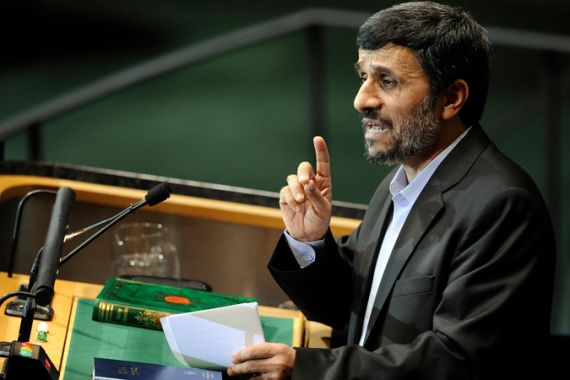US urged to tackle Iran
Several leaked documents show how Gulf countries and Israel sought to influence US action on Iran’s nuclear ambitions.

 |
| Leaked cables suggest strong support for military action against Iran [EPA] |
Among the documents in the cache of quarter-million files are striking passages detailing US observations from meetings with foreign leaders regarding Iran.
A series of diplomatic cables sent from US diplomats in the Middle East to the US state department in Washington reveal efforts by Gulf countries and Israel to influence US opinion.
The following are excerpted from cables that were published in The New York Times:
From US embassy in Abu Dhabi, UAE — May 16, 2006
Turning to Iran, MbZ voiced certainty that the EU-3 efforts with Iran would break down and that Iran would resume its nuclear activities ) if it had not already done so. Repeating concerns first voiced to us in February (reftel), MbZ appeared convinced that it was only a matter of time before Israel or the U.S. would strike Iranian nuclear facility targets. U.S. installations in the Gulf could be targeted by Iran in the aftermath of such an action, he warned. MbZ agreed with the USG,s tough line with Tehran and the Europeans. A nuclear-armed Iran would destabilize the Gulf region and possibly allow terrorist access to WMD.
[MbZ is Abu Dhabi crown prince Mohammed bin Zayed]
From US embassy in Abu Dhabi, UAE — April 29, 2006
In recent meetings with senior USG officials, Abu Dhabi’s ruling family has expressed clear support for U.S. initiatives against Iran. The U.S. and UAE have a “common desire to succeed,” AbZ told U/S Joseph, noting that the combination of Iran and terrorism is something that cannot be tolerated. “The threat from al-Qa’ida would be minor if Iran has nukes,” AbZ said (ref N). MbZ told Townsend April 22 that the Iranians think that the U.S. will not do anything about their recent declaration that they have successfully enriched uranium. He added that he thought the Iranians were wrong. MbZ and UAE Vice President and Prime Minister Sheikh Mohammed bin Rashid agreed with Secretary Rice February 23 about the need to counter Iran’s growing influence in the region and its nuclear ambitions, although they specified that any sanctions should target the key Iranian leadership, not the Iranian people.
[AbZ is UAE foreign minister Abdullah bin Zayed]
From US Embassy in Riyadh, Saudi Arabia — April 4, 2008
The King, Foreign Minister, Prince Muqrin, and Prince Nayif all agreed that the Kingdom needs to cooperate with the US on resisting and rolling back Iranian influence and subversion in Iraq. The King was particularly adamant on this point, and it was echoed by the senior princes as well. Al-Jubeir recalled the King’s frequent exhortations to the US to attack Iran and so put an end to its nuclear weapons program. “He told you to cut off the head of the snake,” he recalled to the Charge’, adding that working with the US to roll back Iranian influence in Iraq is a strategic priority for the King and his government.
[Adel al-Jubeir is Saudi ambassador to the US]
From US embassy in Manama, Bahrain — November 4, 2009
King Hamad pointed to Iran as the source of much of the trouble in both Iraq and Afghanistan. He argued forcefully for taking action to terminate their nuclear program, by whatever means necessary.”That program must be stopped,” he said. “The danger of letting it go on is greater than the danger of stopping it.”
[King Hamad bin Isa Al Khalifa is Bahrain’s monarch]
From US embassy in Tel Aviv, Israel — June 2, 2010
When asked if the USG and GOI have fundamental differences of opinion when assessing Iran’s nuclear program, Barak said we share the same intelligence, but acknowledged differences in analysis. He suggested that the USG view is similar to presenting evidence in a criminal court case in which a defendant is presumed innocent until proven guilty. As such, USG standards are tougher — especially following the failure to find WMD in Iraq — while end-products such as the 2007 NIE unintentionally take on a softer tone as a result. Barak said the fate of the region and the world rests on our ability to prevent Iran from gaining nuclear weapons — as such, the standards for determining guilt should be lower as the costs are higher.
[Ehud Barak is Israel’s defence minister]